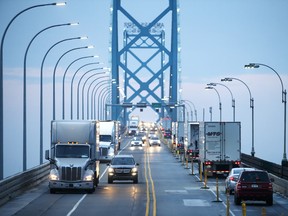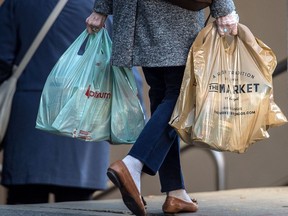The biggest obstacles companies are reporting relate to supply, the inverse of 2020 when executives were mostly troubled by lack of demand
Article content
The economy was always going to rally as soon COVID-19 restrictions were eased. But now that the easy phase of the recovery is over, we’ve entered a stage where the path to good times becomes less obvious. The future looks bright, but are we confident we know how to get there?
Advertisement
This advertisement has not loaded yet, but your article continues below.
Article content
Canada’s businesses rode outsized annualized growth rates of 5.5 per cent and 9.3 per cent in the first quarter of 2021 and the final quarter of 2020, respectively. Still, many of them were waiting for the next shoe to drop as summer ended, according to a survey of 16,900 employers released on Sept. 23 by the Canadian Chamber of Commerce.
The country’s job creators were confident about the short term in July and August, when Statistics Canada conducted the poll on the chamber’s behalf: 85 per cent said they expected demand would stay the same or increase over the next three months, compared with 62 per cent at the start of the year. They also liked the look of the horizon: 76 per cent of respondents said they were either “somewhat optimistic” or “very optimistic” about the next 12 months.
Advertisement
This advertisement has not loaded yet, but your article continues below.
Article content
That jibes. Economic growth was solid, if unspectacular, before the pandemic triggered an epic recession in March 2020. The jobless rate was about as low as it’s ever been. The forces responsible for those numbers — immigration and the shift to a digital economy — remain in place. The crisis even accelerated the embrace of digital technology, while immigration will return to earlier levels now that travel restrictions are being eased.
“We’re just seeing steady growth in container volume,” Robin Silvester, chief executive of Vancouver Fraser Port Authority, which oversees Canada’s biggest port, told the Financial Post’s Bianca Bharti on Sept. 23. “Over the last two years, there’s been growth ahead of the rate we would have expected. It really comes down to a growing population in Canada.”
Advertisement
This advertisement has not loaded yet, but your article continues below.
Article content
But what about six months out? Or nine? The chamber’s survey didn’t specifically ask, but it picked up a sense of trepidation about all the things that could go wrong between now and a post-pandemic world where the shift to green energy and a digital economy promises to create a once-in-a-lifetime opportunity to generate profits.
Almost 40 per cent of respondents said they were unsure how long they would last before they considered shutting down, and 33 per cent said they didn’t know how much longer they could carry on before considering layoffs, up from 18 per cent in the second quarter.
It’s easy to understand where the fear is coming from. It was becoming clear in August that COVID-19’s Delta variant was going to wreak havoc, no matter how high a country’s vaccination rate happened to be.
Advertisement
This advertisement has not loaded yet, but your article continues below.
Article content
Such wariness was warranted: the average new cases per million people has surged in Saskatchewan and Alberta over the past seven days compared with the average over the previous 28 days, according to data compiled by National Bank’s economics team. Case counts are also rising in Quebec, New Brunswick, Manitoba, Prince Edward Island, Nova Scotia and Newfoundland and Labrador. That will weigh on business confidence. Figuring out how to handle the Christmas shopping season has become more difficult in recent weeks.
But perhaps the bigger issue for companies at this stage is filling the orders that are piling up. The supply shortages that have come to characterize the COVID-19 recovery are proving to be more persistent than many expected. The most likely scenario remains that the shortages will recede as producers ramp up production, supply-chain bottlenecks start to loosen and workers return to the labour force. But it’s become hard to predict when conditions might return to normal.
Advertisement
This advertisement has not loaded yet, but your article continues below.
Article content
The chamber’s survey shows that the biggest obstacles companies are reporting relate to supply, the inverse of 2020 when executives were mostly troubled by a lack of demand. Thirty-five per cent of respondents said some combination of rising input costs, recruiting skilled workers and overall labour shortages would cause them the most difficulty over the next three months.
“Businesses are telling us we have shifted to a phase where supply is going to be the biggest concern, rather than demand,” Stephen Tapp, the chamber’s chief economist, said in an interview. “The supply side is now the key issue for Canada’s economy.”
That adds to the danger. It’s been a long time since supply registered as a threat to growth. The smooth flow of ever-cheaper goods and services is something that most decision-makers had come to take for granted, a steady state created after a few decades of globalization centred around China’s rise as supplier to the world.
Advertisement
This advertisement has not loaded yet, but your article continues below.
Article content
New realities heighten the risk of unintended consequences. NFI Group Inc., the Winnipeg-based maker of buses, unexpectedly cut its revenue outlook earlier this month after it realized it wasn’t going to be able to source enough parts. The company’s stock price was still down about eight per cent a week after it made the disclosure.
Mistakes will be made in the months ahead, but so will fortunes. Growth will depend on people who are willing to take risks, and hopefully they outnumber those who end up frozen by uncertainty. Odd Burger Corp., a Toronto-based vegan fast-food chain, plans to push through all the headwinds facing its industry. James McInnes, the founder and chief executive, is investing in state-of-the-art technology to keep his costs down.
“The way you beat inflation is to become more efficient,” he said in an interview earlier this month. “We’re trying to disrupt.”
• Email: kcarmichael@postmedia.com | Twitter: CarmichaelKevin
Advertisement
This advertisement has not loaded yet, but your article continues below.
Supply could be bottleneck as hard part of economic recovery begins
2021-09-24 22:00:16






